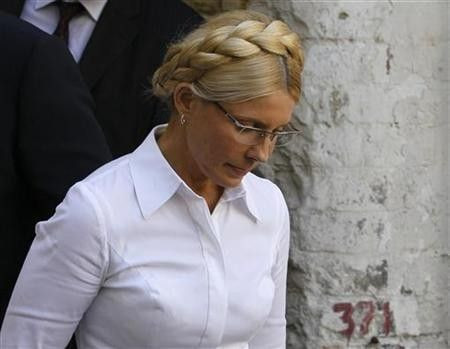Ukraine: Former PM Tymoshenko Gets Seven Years for Abuse of Office

Former Ukrainian Prime Minister Yulia Tymoshenko was sentenced to seven years in prison by a judge in Kiev on Tuesday.
The court found Tymoshenko guilty of abusing her powers while in office by signing a 10-year gas deal with Russia that could cost Ukraine between $200 and $440 million.
Bearing in mind the fact that the court has not established any circumstances aggravating or mitigating Tymoshenko's punishment, and given the heightened social danger of the crime committed by Tymoshenko, her personality and the absence of any penitence on her part, the court sees no grounds to hand down a more lenient sentence, Judge Rodion Kireyev, the court's chairman, proclaimed on Tuesday.
Tymoshenko went on trial in July over the 2009 gas contracts. Prosecutors claimed Tymoshenko ordered state gas company Naftogaz to pay too high a price with Russia and Vladimir Putin. Her lawyers will appeal the conviction in Ukraine, and if that fails, in the European Court of Human Rights in Strasbourg, France, according to The Wall Street Journal.
Dear friends, I just want to say that I disagree with this verdict and I am saying that the year 1937 is back again, Tymoshenko said in the courtroom on Tuesday, referencing Josef Stalin and the Soviet Union.
Earlier, Tymoshenko had been charged with a similar crime after she purchased 1,000 Opel Kombo vans for the government at 20 percent above the market value.
Throughout the trial, thousands of people have gathered outside the courthouse in support of Tymoshenko, many with signs and chanting slogans. Before arriving in court, Tymoshenko could be seen greeting the protestors and even kissing some on the lips.
In August, Tymoshenko's female base staged protests in the capital's central square. Dressed as the former Prime Minister, with Tymoschenko's signature braid, the feminist supporters ripped off their shirts in protest before being taken away by the police.
Tymoshenko has called the trial a politically charged farce, and claims that the accusations are an attempt by President Viktor Yanukovich to force her out of national politics.
I declare you a puppet of the presidential office, Tymoshenko told Judge Rodion Kireyev at a pre-trial hearing in June. You don't have the right to consider this case. You are fully integrated into a system of political repression directed by authorities.
My voice will be even louder from prison, because the whole world will hear me, she said.
The courtroom itself at times became a battleground. Tymoshenko refused to rise for the presiding judge, and on many occasions supporters rushed the court room, requiring short recesses and riot police.
The case has been criticized both in Ukraine and abroad. The European Union said it was “deeply disappointed” by the verdict, and it could tarnish the organization's relationship with the current Ukrainian government.
The way the Ukrainian authorities will generally respect universal values and rule of law, and specifically how they will handle these cases, risks having profound implications for the EU-Ukraine bilateral relationship, EU foreign policy chief Catherine Ashton said in a statement.
Tymoshenko, who was the nation's first female prime minister, serving from 2007 to 2010, was one of the heroes of Ukraine's Orange Revolution. She is the currently the leader of Ukraine's opposition party, but will likely be replaced.
© Copyright IBTimes 2024. All rights reserved.





















